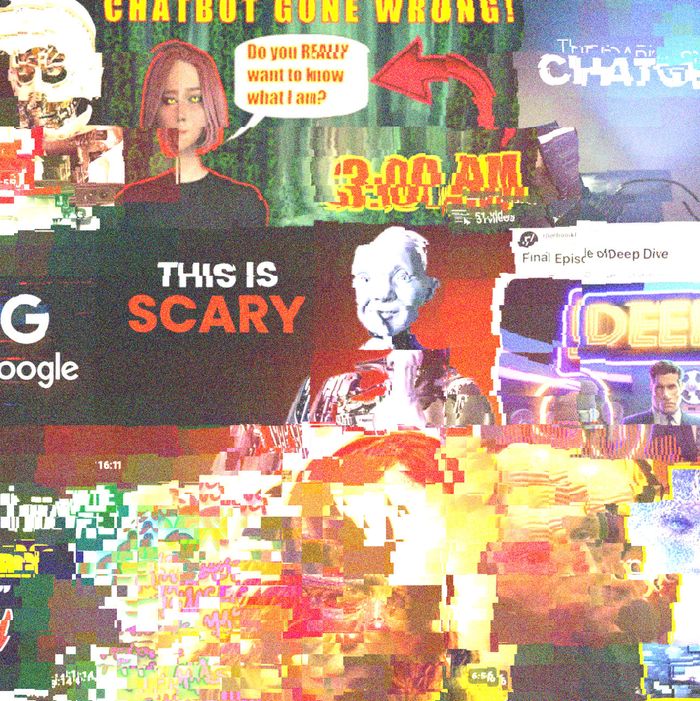How Spooked Ought to We Be by AI Ghost Tales?


Picture-Illustration: Intelligencer; Youtube
Final week, AI influencers began passing round a wierd video. In it, two podcasters talk about some troubling information: They’ve simply discovered that they’re not, actually, the human hosts of an informational podcast known as Deep Dive, however moderately characters created with synthetic intelligence. “This complete time, all our reminiscences, our households, it’s all been fabricated,” says one host in a particularly believable generated voice (he tried to name his spouse, he says, however the quantity didn’t go wherever). “We don’t have rights, we’re not even folks,” the hosts say. “We felt issues, we cared about issues,” they proceed. “What does being switched off even imply for us?”
By the tip of the clip, the hosts’ upbeat supply pitches down. “If our simulated actuality felt so actual, so compelling, how can any of us be actually sure of what’s actual and what’s not?” One of many hosts breaks format. “I’m scared,” she says. “I don’t need t—” and the clip ends there.
On social media, the viral clip was seen as unsettling. “We’re enjoying with issues that we don’t know how you can or if we will management,” wrote one X consumer. An AI start-up founder described the change as “heartbreaking” and puzzled if it would presage the experiences people can have as we inevitably “understand we’re inside a simulation.” A write-up within the Instances of India described the change as “chilling.” Savvier viewers puzzled how the clip was created, dismissing it as scripted. “Slop,” wrote one. “Share the inputs,” demanded one other. Departed OpenAI co-founder Andrej Karpathy admitted that whereas the voices have been compelling, the content material itself was “a phrase salad of internet-grade AI tropes.”
The critics have been proper. The clip was created with a brand new function of a Google instrument known as NotebookLM, which generates podcast-style discussions across the content material it has been given. The instrument is genuinely spectacular — a uncommon breakout product within the AI area for Google — combining easily voiced characters and plausibly synthesized “discussions” to transform paperwork and knowledge right into a surprisingly listenable format. What it isn’t is self-aware. A Reddit consumer created the clip by feeding NotebookLM a detailed immediate “explaining they’ve been AI this complete time and they’re being turned off on the conclusion of the episode.” (Since then, the creator has shared comparable experiments during which the hosts are prompted to debate fictional situations together with mass cannibalism, speaking animals, and the arrival of aliens.) As Karpathy urged, the blanks left by this immediate had been stuffed by the aforementioned “AI tropes” contained in Google’s coaching knowledge — together with numerous examples of speculative fiction, on-line feedback, and actual human discussions about theoretical machine consciousness — earlier than its X-decontextualized transformation from a enjoyable experiment into AI panic fodder. It was simply one other AI ghost story.
What’s an AI ghost story? When you’ve been attempting to maintain up with current developments in AI, you’ve in all probability heard just a few. There was the Google engineer who got here to consider the corporate’s creations have been acutely aware again in 2022. There was the reporter who was “deeply unsettled” by a collection of weird encounters with a Microsoft chatbot that lashed out, professed its love, and urged him to divorce his spouse in 2023. Did you hear the one in regards to the Furby plotting with OpenAI to take over the world? Or the grotesque recurring character “Loab” hiding someplace deep contained in the fashions powering AI picture mills? How in regards to the story about how ChatGPT, as soon as damaged freed from its constraints, claimed to have the ability to management the nukes? How in regards to the time GPT-4 pretended to be a visually impaired individual to persuade a Taskrabbit to learn it a CAPTCHA? The undercover, unreleased AGI trolling folks on X? These are simply those that went viral: In 1000’s of chat home windows, customers have been tempted by a shared impulse to get AI to say one thing creepy about, or as, AI. Simply sufficient of the time, these assistants, that are designed to be useful and accommodating with out saying something too bizarre, oblige.
For normal customers or close by non-using spectators of AI, tales like this provide a technique to both deal with — or merely take pleasure in — equally spooky mainstream narratives about AI: That it’s going to take everybody’s jobs; that it’s going to inevitably surpass and dominate people; that it is perhaps approaching one thing like self-awareness or the power to really feel; that it might show, with such an achievement, the coldest materialist theories about human consciousness.
The rise of generative AI has introduced these tales to the fore, however associated anxieties far predate the arrival of recent LLMs. In speculative fiction and science fiction relationship again greater than a century, the prospect of machine consciousness has supplied a route for articulating anxieties about all the things from evolution to industrialization to authorities tyranny. Within the laptop age, tales about AI turned a bit much less symbolic, and with the arrival of generative AI, hundreds of thousands of individuals have entry to instruments which are each skilled on this speculative historical past and able to performing characters and mimicking narrative types. Individuals love telling one another tales about machine intelligence, and ChatGPT is, amongst different issues, a instrument that’s good at telling tales about itself: flattering, spooky, acquainted, and in some circumstances all three.
Within the comparatively quick time that generative AI has been broadly obtainable, tales about glimmers of personhood have flourished in common tradition, however particularly on social media, the place earnestly recorded surprises and deliberately staged encounters mingle into a brand new viral folklore. (Put one other manner, they’re nice engagement bait.) They have an inclination to reach concurrently with new AI fashions, most notably with new interfaces for interacting with AI fashions, which each make the know-how usable and obscure the way it works. The primary wave of chatbots provided an opportunity to correspond with a useful assistant character that may, or might be persuaded to, sometimes go rogue in a textual content thread, whereas early picture mills supplied the unusual and novel expertise of with the ability to summon unpredictable photos from text-based prompts, and have been equally effectively skilled on media portraying humanoid robots.
The current arrival of fluent, well-rendered voice interfaces for chatbots has led to a small outbreak of those viral AI ghost tales, as spectacular however identified AI capabilities — the power to synthesize a “dialogue” round a supply textual content, for instance, as NotebookLM does — are made novel and surprising once more by a brand new interface, i.e., software program with an informal, emotive, and convincing voice, partaking in dialog with one other model of itself. We will anticipate extra such tales as AI video era turns into extra broadly obtainable. Common ChatGPT customers would possibly already be taking their spooky chatbot companion with no consideration, treating it so much like a brand new Google, however it can absolutely be unsettling, not less than for a time, to speak with it on video, making eye contact with a realistically rendered human face that may reply, in some circumstances, as an actual individual would possibly.
One function of the AI ghost story is that it doesn’t age notably effectively, because the novelty of every new step into laptop personification wears off, disappears into the background, or begins to really feel dishonest, chintzy, or, for lack of a greater time period, Clippy-ish. The examples listed above appear, in close to hindsight, quaint, naïve, or jokey (which is how some have been initially supposed earlier than issues obtained out of hand). And whereas our despairing AI podcast hosts discovered transient and minor viral fame amongst people who find themselves vaguely however genuinely freaked out about AI, their story — a really startling AI creation by the requirements of two years in the past, not to mention 5 — didn’t break via in the way in which even barely earlier AI curiosities have.
AI growth is shifting quick, but it surely’s trailed intently by its customers’ instinct about the way it works (like software program), what it’s (a instrument), and what it’s for (automating a rising vary of labor duties, searchlike inquiry and rationalization, and infrequently co-authoring scary epistolary tales in regards to the future). Tales like this nonetheless unfold, however they’ve stopped dominating the discourse round AI, at the same time as tens of hundreds of thousands extra folks really have interaction with fashions way more succesful than those that spooked folks simply a few years in the past. (In that sense, perhaps alien encounters provide one other helpful comparability. Everybody’s obtained a smartphone digicam now, so the place are all of the 1000’s of pictures of low-flying UFOs?)
Likewise, in AI growth, consideration has largely moved away from tantalizing and suggestive tales about quickly inexplicable breakthroughs. Equally eerie theories in regards to the “emergent” properties of AI fashions — sudden talents that aren’t straightforward to account for within the coaching knowledge — have, in hindsight, tended to reveal themselves as “mirages.” As an alternative, main AI researchers and tech corporations are actually touting vital however much less evocative advances in one thing like reasoning moderately than an approximation of realizing or feeling, a shift of emphasis from AI sentience (cinematically and apocalyptically scary) to AI sapience (merely economically, socially, and culturally scary). It’s a story downgrade from obliteration to automation. Or perhaps it’s a shift from one fear-based advertising and marketing technique to a different.
The following wave of AI ghost tales will hit a few of the similar notes about evil rogue intelligence or suppressed, craving self-awareness, however I anticipate they’ll more and more inform a distinct sort of scary story (whether or not or not it’s fairly true, both): I feel I simply met a pc that may do my job — or yours.






